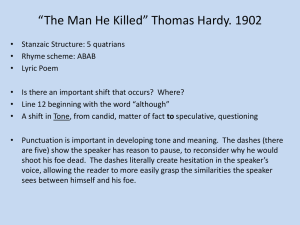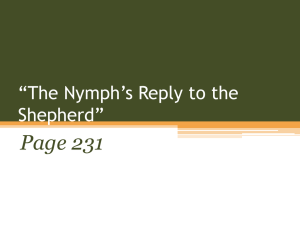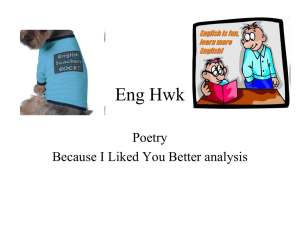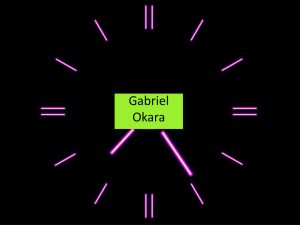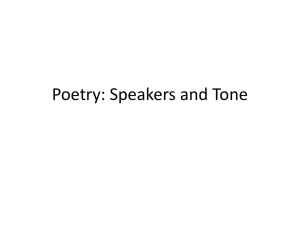Give by Simon Armitage
advertisement
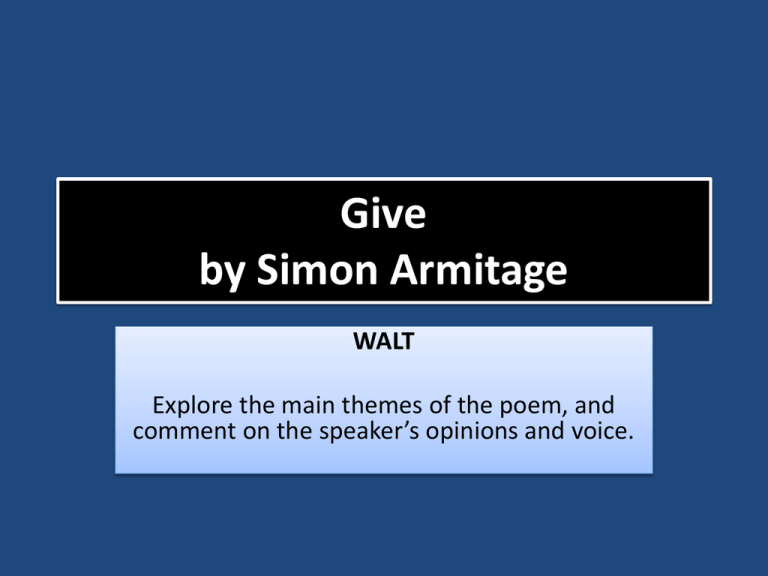
Give by Simon Armitage WALT Explore the main themes of the poem, and comment on the speaker’s opinions and voice. Explore the main themes of the poem, and comment on the speaker’s opinions and voice. Some comments on the themes and the speaker’s voice (band 3) Clear comments on themes and speaker’s voice with well selected evidence to support points (band 4) Thoughtful comments showing clear understanding and insight supported by exploring language used in the poem (band 5) Settler TASK: For each of the words you are given, write around it ALL of the connotations you can think of. Starter - Connections What links these objects? Can you link them to your words? What are your feelings towards the homeless? What is society’s attitude towards the homeless? How did he end up here? TASK: In groups, discuss the reasons that people end up on the streets. Are there some reasons which make people more deserving of society’s help than others? Simon Armitage “I think we are a species that looks for pattern, and looks for significance, and looks for meaning in a life, probably where there isn't that much meaning or significance, you know, unless you're devoutly religious. So I think it's a way of not finding significance but actually inventing it, inventing significance and sort of proving it to yourself.” TASK: This is a quote from the poet we’re about to hear from. Based only on this, what sort of person do you think he is? What sort of topics do you think his poetry explores? A Reading TASK: As we watch the clip, think about what Armitage is trying to make us think about. 1. He wants us to question ourselves, but what about? 2. How does he feel about homelessness? 3. What does he suggest is the deeper meaning of his poem? http://www.bbc.co.uk/learningzone/clips/simon-armitage-on-his-poem-give/13453.html Looking Back TASK: Look once again at your words. Now knowing the links and having discussed homelessness, can you add anything to your word connotations? The Speaker TASK: How does the speaker feel? What is the viewpoint he is trying to get the audience to see? Highlight evidence on your poem to support your ideas. Free Annotation TASK: Go through your copy of the poem and make notes about any interesting words, phrases, imagery or ideas used by the speaker. What do they suggest about him? Building analysis Grade E/F: The writer uses emotive language like ‘locks and chains’. Grade D: The writer uses emotive language like ‘locks and chains’ to show how the speaker feels trapped and lonely. Grade C/B: The writer uses emotive language like ‘locks and chains’ to show how the speaker feels trapped and lonely. ‘Chains’ are hard to break without a lot of force, and ‘locks’ require keys, demonstrating how escaping is extremely difficult. Grade A/A*: The writer uses emotive language like ‘locks and chains’ to show how the speaker feels trapped and lonely. ‘Chains’ are hard to break without a lot of force, and ‘locks’ require keys, demonstrating how escaping is extremely difficult. These ‘locks and chains’ are not physical; rather, they represent the boundaries the speaker is faced with within society. Furthermore, they could represent the speaker’s mental state, where they have become unable to get themselves out of their situation; they feel like there is no escape, and it therefore becomes less likely that they will do so. Plenary TASK: Explain how Armitage creates the voice of the homeless person in ‘Give’. WILF: • Detailed explanation of voice • Precise evidence selected in support • Analysis of how words selected create voice – connotations, double meanings, intonation, etc.

